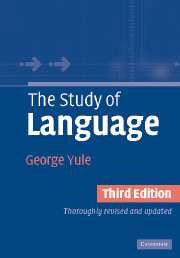Book contents
- Frontmatter
- Contents
- Preface
- The origins of language
- Animals and human language
- The development of writing
- The sounds of language
- The sound patterns of language
- Words and word-formation processes
- Morphology
- Phrases and sentences : grammar
- Syntax
- Semantics
- Pragmatics
- Discourse analysis
- Language and the brain
- First language acquisition
- Second language acquisition/learning
- Gestures and sign languages
- Language history and change
- Language and regional variation
- Language and social variation
- Language and culture
- Appendix: Suggested answers to study questions
- Glossary
- References
- Index
Semantics
- Frontmatter
- Contents
- Preface
- The origins of language
- Animals and human language
- The development of writing
- The sounds of language
- The sound patterns of language
- Words and word-formation processes
- Morphology
- Phrases and sentences : grammar
- Syntax
- Semantics
- Pragmatics
- Discourse analysis
- Language and the brain
- First language acquisition
- Second language acquisition/learning
- Gestures and sign languages
- Language history and change
- Language and regional variation
- Language and social variation
- Language and culture
- Appendix: Suggested answers to study questions
- Glossary
- References
- Index
Summary
The words Fire Department make it sound like they're the ones who are starting fires, doesn't it? It should be called the “Extinguishing Department”. We don't call the police the “Crime Department”. Also, the “Bomb Squad” sounds like a terrorist gang. The same is true of wrinkle cream. Doesn't it sound like it causes wrinkles? And why would a doctor prescribe pain pills? I already have pain! I need relief pills!
Carlin (1997)Semantics is the study of the meaning of words, phrases and sentences. In semantic analysis, there is always an attempt to focus on what the words conventionally mean, rather than on what an individual speaker (like George Carlin) might want them to mean on a particular occasion. This technical approach is concerned with objective or general meaning and avoids trying to account for subjective or local meaning. Linguistic semantics deals with the conventional meaning conveyed by the use of words, phrases and sentences of a language.
Conceptual and associative meaning
When we investigate the meaning of words in a language, we are normally interested in characterizing the conceptual meaning and less concerned with the associative meaning of the words. Conceptual meaning covers those basic, essential components of meaning that are conveyed by the literal use of a word. Some of the basic components of a word like needle in English might include ‘thin, sharp, steel instrument’. These components would be part of the conceptual meaning of needle.
Information
- Type
- Chapter
- Information
- The Study of Language , pp. 100 - 111Publisher: Cambridge University PressPrint publication year: 2005
Accessibility standard: Unknown
Why this information is here
This section outlines the accessibility features of this content - including support for screen readers, full keyboard navigation and high-contrast display options. This may not be relevant for you.Accessibility Information
- 1
- Cited by
